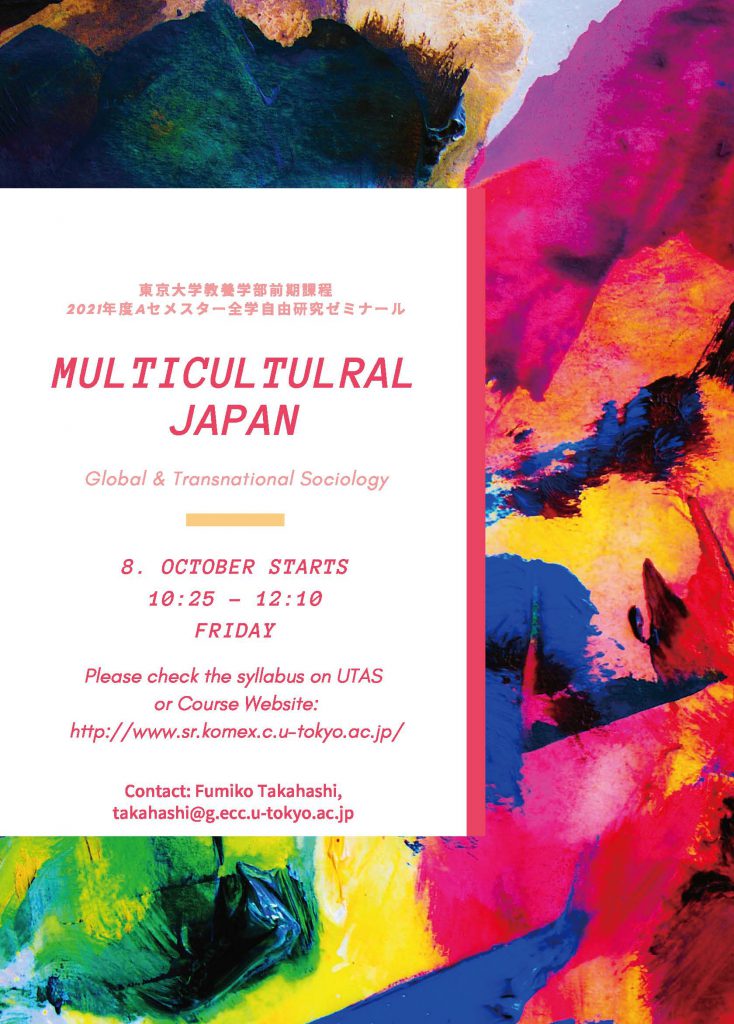This course explores how globalization and transnationalism affect Japanese society, focusing on the transnational mobility of people, in other words, migration. We will explore the experiences of migrants and try to understand how ethnicity and nationalism are affecting their lives, as well as gender and social class.
Immigrants in the nation-states are often treated unequally in various fields such as politics, economies, education, etc. In the time of Covid-19, the gap between the immigrants and the majority may further widen in terms of the provision of information, medical care, education, etc. In this course, we will also pay attention to such recent situations.

Keywords
Globalization, Transnationalism, Immigrants, Refugees, Ethnicity, Nationalism, Multicultural Society, Immigrant Integration, Minority, Equality, Equity, Social Inclusion/Exclusion
The aim of this course is to learn the basic concepts and theories in the field of transnational sociology such as ethnicity, nationalism, migration, integration, equality, inclusion/exclusion, etc. and discuss them in class to improve understanding.
Lectures including pair/group work
・ Students will be expected to read the articles before each class.
・ Students will be expected to actively participate in and contribute to pair/group work.
* The course schedule is subject to change depending on the number of students and their interests.
| Week | Topics |
| Part I Transnational Sociology: Overview | |
| 1 | Introduction and Guidance Introduction ・Globalization and Methodological Nationalism ・Global/Transnational Phenomena Guidance ・Scope, Objectives, Expected Outcomes of this Course ・Schedule ・Assessment ・Readings |
| 2 | Transnational Mobility and the Nation-States ・Key concepts Immigrants and Refugees, EthnicityNationalism and National Identity, Citizenship, Nationalities, Racism etc. |
| Part II Transnational Experiences | |
| 3 | Family ・Comparative Family Studies ・Transnational Networks of Migrants ・The Meanings of Families |
| 4 | Identity and Belonging ・Media and Identity of Immigrant Youth |
| 5 | Education ・Educational Policies and Practices in Multicultural Society ・Educational Inequality ・ (un)enrollment ・Academic Performance ・Educational Achievement |
| 6 | Labor Market ・Ethnicity and Social Structure ・The Second Generation of Immigrants and Labor Market |
| Part III Intersectionality | |
| 7 | Gender and Ethnicity ・Intersectionality |
| 8 | Social Class and Ethnicity ・Immigrant Household in Poverty |
| 9 | Majority’s Attitude toward Immigrants ・National IdentityXenophobia |
| Part IV Students Presentations | |
| 10 | Students Presentations (1) |
| 11 | Students Presentations (2) |
| 12 | Students Presentations (3) |
| 13 | Review |
To be announced.
Students will be expected to give comments or raise questions after class every week.
We learn a lot from other students’ views and opinions. In order to deepen our understandings, your questions and comments may be shared anonymously in the next class.
Each student will be expected to give a presentation.
English